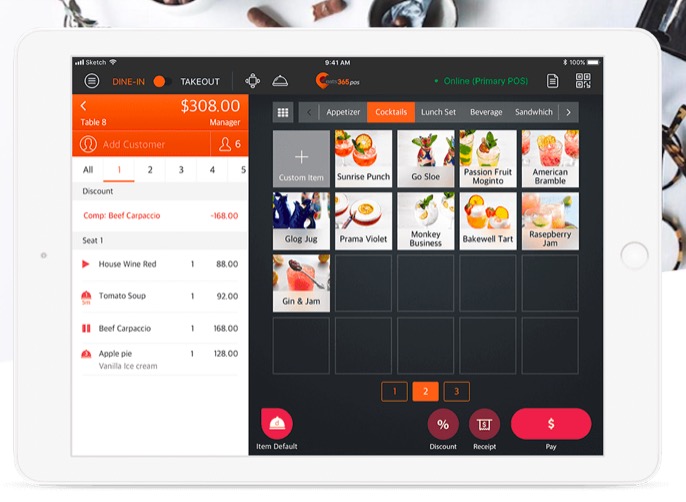Investment Increasing Drastically for Plant-Based Food Tech in Hong Kong, Singapore and Globally
With livestock disease, lack of supply and health conscious trends, could we be seeing the rise of plant-based foods?

快速瀏覽
- A Global Shift
- Vegan Meat Sector Sales Have Grown 200%
- Big Meat is Also Investing into Vegan and Plant-Based Foods
- Meat-Based Regions are Beginning to Show Demand for Plant-Based Alternatives
- Asian Venture Capitalists See Huge potential in Plant-Based Food Tech and are Investing Heavily
- How Can Your POS Help You to Pick up on Such Market Changes
A Global Shift
With the disruption that COVID-19 has caused to the global meat supply chain, many foodies are turning their sights onto plant-based options. "From increasing numbers of outbreaks in meat-processing plants and empty supplies of beef and pork in supermarkets to the public health dangers of industrial meat farming," there are plenty of reasons just from a supply chain perspective why meat is less popular.
We are now seeing plenty of signs that large companies are shifting focus away from meat-based food products and are instead pouring a lot of investment and research into producing healthier, plant-based alternatives. From the customer side, ethical reasons, environmental reasons or even health reasons are turning away a large chunk of the global population from eating as much meat as they used to. Thanks to the growing demand for meat alternatives, we are seeing more investment into plant-based meats in Asia, as well as on a global scale.

Vegan Meat Sector Sales Have Grown 200%
It is very possible that the Coronavirus pandemic has had a large impact on the meat industry, as a whole. We can see, for example, that "sales of vegan meat have soared due to coronavirus-induced food safety concerns and dwindling meat supplies in the US." A study done by consumer data group Nielsen, has found that vegan meat sales in the US are up by 200% when compared to the same period in March, 2019.

Big Meat is Also Investing into Vegan and Plant-Based Foods
With mandatory large-scale shutdowns of several meat plants, big meat companies are being forced to adopt a new business model and mindset to diversify their product range. Given the unstable nature of the meat industry at the moment, investing in a rapidly-growing market like plant-based meat substitutes offers big meat companies the chance to look like they are making more ethical decisions while also ensuring that if demand for meat continues to be unreliable, they can at least make a profit from their other investments in plant-based foods. "Huge companies such as Tyson, Smithfield and Hormel Foods had already been investing in plant-based alternatives prior to the pandemic, but will be aggressively rolling out more vegan options in a bid to diversify their business model and weather external shocks like the coronavirus." Indeed, Tyson Foods announced back in 2019, that they were already working on a plant-based, vegan meat substitute.

Meat-Based Regions are Beginning to Show Demand for Plant-Based Alternatives
In Hong Kong, eating meat is a staple of life. Pork, chicken, beef and seafood are available readily at almost every restaurant in the city; while vegetarian options have been trickier to find in the past. However, we are beginning to see a slow, but steady tide shifting the other way. As people become more wary about the potential virus and hygiene risks associated with meat production and also shift toward healthier lifestyles, demand for plant-based alternatives have been taking the city by storm. Be it burger joints offering substitutes like Beyond Meat, supermarkets stocking vegan meats or restaurants increasing vegetarian options, we are definitely seeing a change in attitude in a very meat-heavy city.
Just recently, large dim sum chain Tong Kee Bao Dim partnered with Green Monday and launched 4 vegan options made from a meat substitute called Omnipork. "The new menu items include Omnipork & Vegetable Bun and Omnipork & Vegetable Dumplings, which will be available across all 100 locations citywide, as well as Steamed Rice with Omnipork Strip and Omnipork in Tomato Sauce with Rice." Speaking about the partnership, David Yeung, CEO of Green Monday said, "This collaboration between OmniPork and Tong Kee Bao Dim is a perfect example of plant-based innovation going mass, the best practice of making green common."

Asian Venture Capitalists See Huge potential in Plant-Based Food Tech and are Investing Heavily
Hong Kong is not only seeing a trend in restaurants offering plant-based meat substitutes, but there is also impetus among Hong Kong venture capitalists to invest in new forms of plant-based foods. For example, "Hong Kong-based early stage investment fund Vectr Ventures led the US$4.6 million seed funding round for San Diego-based Plantible Foods, which closed in late March this year." The reason that investment into this new sector is increasing so drastically is because, "Asia's existing issues of a ballooning population, urbanisation and food insecurity have all been exacerbated by the pandemic, and startups that focus on plant-based foods - such as Plantible's duckweed-based vegan protein - will become a core part of the solution to feed the continent sustainably."
Singapore is also seeing heavy investment and growth in their plant-based meat alternative industry. "Most recently, Singapore's plant-based protein company Growthwell raked in US$8 million from Singapore's sovereign fund Temasek, alongside a number of institutional investors. The company has acquired a stake in Israeli food tech ChickP to develop a new chickpea protein isolate for Asian-specific vegan products, a move that Growthwell chief Justin Chou believes is a "timely solution to tackle the food security issue" highlighted by the pandemic."

How Can Your POS Help You to Pick up on Such Market Changes?
Your POS is a powerful tool that can provide you and your business with plenty of information. One of the most important metrics that any F&B business owner should always keep tabs on is item analysis. Having a good grasp on what food items are selling well versus what aren't, can be a great indicator of market dynamics. For example, if you notice a surge in customers ordering vegetarian or vegan options, you will easily be able to adjust your menu to offer more such options to customers. These metrics are also great to help cut back on ingredients that aren't being used much so that you can save on cost - a very important thing, given how badly the COVID-19 pandemic has hit the F&B industry.